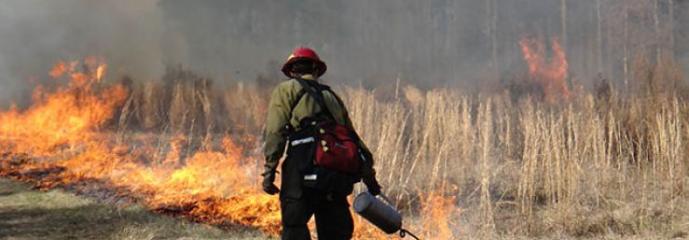Project Overview

What is SMART FIRES?
SMART FIRES (Sensors, Machine Learning, and Artificial Intelligence in Real-Time Fire Science)* is a partnership among Montana State University, University of Montana, Salish Kootenai College, Little Big Horn College, Montana Technical University and Flathead Valley Community College. The project expands jurisdictional research capacity to address knowledge gaps in prescribed fire usage and its impact on individuals and communities. Prescribed fire refers to the controlled application of fire to restore ecosystem health and mitigate wildfire risk in the Western U.S.
* The team has updated the working title from the original proposal name, 'Integrating Montana’s Environmental Research with Smart Sensors (IMERSS)'.
What questions does SMART FIRES address?
SMART FIRES is guided by two foundational questions:
1) How do prescribed fire energy and emissions depend on fuel properties, topography, and environmental conditions?
2) How do the smoke emissions from prescribed fire affect individuals and communities?
What technologies is SMART FIRES generating?
SMART FIRES is developing a new generation of smart optical sensors that integrate emerging engineering technologies with artificial intelligence (AI) and machine learning (ML). These instruments measure prescribed fire behavior and other fire/smoke metrics in real time. The project also focuses on methods to assess and communicate the benefits and risks of prescribed fire. SMART FIRES is enhancing research capabilities through strategic hires and interdisciplinary collaboration, and is building a skilled workforce in ecosystem management, optical engineering, AI/ML, environmental chemistry, and social science.
What are the different research thrusts of SMART FIRES?
Fire and Smoke Science (FSS)
Focuses on fire radiative energy, emissions, and air quality impacts. Team: Lu Hu (UM), Carl Seielstad (UM), Loyd Queen (UM), Robert Yokelson (UM), Robert Walker (MSU), Xiaobing Zhou (MTU)
Smart Optical Sensors (SOS)
Develops ground- and UAS-based optical sensors with onboard AI/ML. Team: Joseph Shaw (MSU), Kevin Repasky (MSU), Ross Snider (MSU), Timothy Price (FVCC), Cody Sifford (SKC)
Social Psychology, Economics, and Ethics (SPEE)
Studies trust in information sources and decision-making. Team: Libby Metcalf (UM), Kristen Intemann (MSU), Katrina Mullan (UM), New hire (LBHC)
Artificial Intelligence and Machine Learning (AIML)
Applies AI to process data and predict fire outcomes. Team: John Sheppard (MSU), Brad Whitaker (MSU), Jesse Johnson (UM), Drew Grennel (SKC), 2 new hires (UM), 2 new hires (MSU).
What is the role of Research and Data Cyberinfrastructure (CI)?
SMART FIRES partners with MSU Library's Research Optimization Analytics and Data Services Group, MSU Research Alliance, MSU Research Cyberinfrastructure, UM IT department, and UM College of Forestry IT group. CI Team: Venice Bayrd (MSU), Coltran Hophan-Nichols (MSU), Zach Rossmiller (UM), Sherri McWilliams (UM), Jason Clark (MSU), Todd Kipfer (MSU)
Where is SMART FIRES in the media?
Also see our SMART FIRES blog
Who are our partners?
• Blackfoot Challenge
• Bozeman Field School
• Climate Smart Missoula
• Council for American Indian Programs
• GLOBE Observer
• Missoula County Public Health Department
• Missoula Public Library
• Montana Afterschool Alliance
• Montana DEQ
• Montana DNRC
• Montana Idaho Airshed Management
• Montana Photonics and Quantum Alliance (MPQA)
• NASA AERONET
• National Center for Atmospheric Research (NCAR)
• New Horizons Studio, Hyundai America Technical Center, Inc.
• Northern Rockies Fire Science Network
• Northwestern Energy, Inc.
• NRG Systems
• Polaris Sensor Technologies
• Resonon, Inc.
• SciNation on the Flathead Reservation
• SelectHealth
• The Nature Conservancy of Montana
• SensorLogic
• University of Arizona
• University of Montana Forest & Conservation Experiment Station
• University of Montana Lubrecht Experimental Forest
• U.S. Forest Service Missoula Fire Sciences Laboratory
• Vision Aerial
